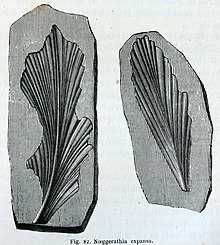Noeggerathiales
| Noeggerathiales Temporal range:
| |
|---|---|

| |
| Noeggerathia expansa | |
| Scientific classification | |
| Kingdom: | Plantae |
| Clade: | Tracheophytes |
| Class: | †Progymnospermopsida |
| Order: | †Noeggerathiales |
| Families | |
Noeggerathiales is a now-extinct order of vascular plants. The fossil range of the order extends from the Upper Carboniferous to the upper Permian (Lopingian). Noeggerathiales have been previously linked to horsetails and ferns, but are currently believed to be progymnosperms, being woody like seed plants, but still producing spores rather than seeds.[1] Noeggerathiales had a tree fern like appearance, with leaves sprouting from the top of an unbranched trunk. They were primarily confined to the wet tropical regions where there was no frost. Noeggerathiales are rare in European and North American floras, but are common components of Cathaysian Chinese floras.[2]
One form, Paratingia wuhaia, resembled a small fern reaching from two to several meters in height.[3]
References
[edit]- ^ Palmer, Douglas; et al. (2009). Prehistoric life : the definitive visual history of life on earth (1st American ed.). New York: Dorling Kindersley. p. 152. ISBN 978-0-7566-5573-0.
- ^ Pfefferkorn, Hermann W.; Wang, Jun (April 2016). "Paleoecology of Noeggerathiales, an enigmatic, extinct plant group of Carboniferous and Permian times". Palaeogeography, Palaeoclimatology, Palaeoecology. 448: 141–150. Bibcode:2016PPP...448..141P. doi:10.1016/j.palaeo.2015.11.022.
- ^ Ancient noeggerathialean reveals the seed plant sister group diversified alongside the primary seed plant radiation
External links
[edit]
